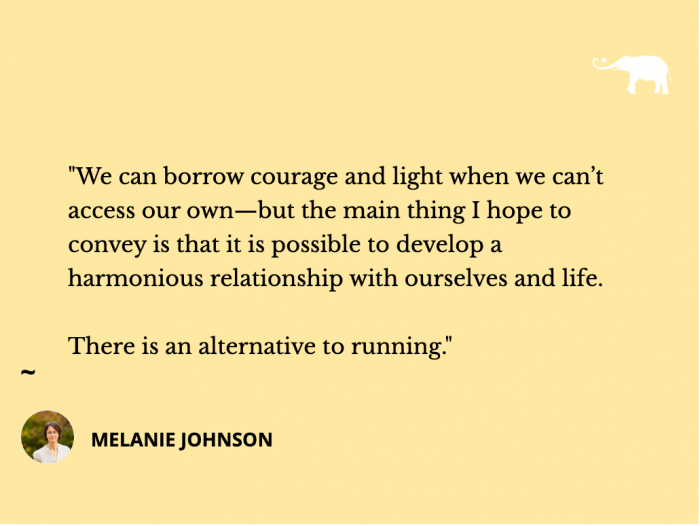View this post on Instagram
~~
A young man was cycling through Europe, and he came to a place where high grasses surrounded the road.
He heard a loud rustling sound, and there emerged a pack of racing wild dogs.
They seemed alarmingly intent on catching up with him. Initially, he sped up, trying to outpace them, but he soon realised they were gaining on him. There was no way he was going to be able to escape.
So, he stopped.
He stood the bike on its stand. Then, he turned and faced them.
The dogs also stopped.
They looked at him, somewhat puzzled. And then, they sidled back into the undergrowth from where they came.
~
This man, Swami Gyan Dharma, is now a spiritual teacher, and he uses this story to illustrate the nature of the mind.
It isn’t possible to outrun our minds. Our thoughts and our feelings will always catch us eventually. But when we turn to face our minds, we find that the things we feared are not the demons we imagined. Instead, we find it within our capacities to meet with these things and even gain from such an encounter.
The choices the modern world offers us to escape from ourselves are many and varied. And while some distraction may be no bad thing, it is not sustainable if used a lot and for a long time.
The story of the pack of dogs offers us hope—we have to turn to face ourselves to be free. It is as simple as that.
Admittedly simple isn’t the same as easy.
Another teacher, Byron Katie, tells the story of teaching in a prison where she heard someone screaming. It was explained to her that the sound was coming from someone in solitary confinement.
What occurred to her was that there was no outer tormentor; the cause of the person’s distress was internal. So, how on Earth can we find freedom from this level of pain?
The first stage of meeting ourselves is to turn and look and say yes to what is present.
~
“This being human is a guest house.
Every morning a new arrival.
A joy, a depression, a meanness,
some momentary awareness comes
as an unexpected visitor.
Welcome and entertain them all!
Even if they’re a crowd of sorrows,
who violently sweep your house
empty of its furniture,
still, treat each guest honourably.
He may be clearing you out
for some new delight.
The dark thought, the shame, the malice,
meet them at the door laughing,
and invite them in.
Be grateful for whoever comes,
because each has been sent
as a guide from beyond.”
“The Guest House” by Rumi
~
A practice that I use and teach uses the word “welcoming” as a guide on how to engage with these inner elements. I love this word. Like Rumi’s host in the poem, it suggests an attitude of delighted friendliness to see all the parts of ourselves equally.
More than a mere technique, the practice of welcoming is a portal that connects us to our true nature. Many spiritual traditions reassure us that the fundamental nature of the mind is clear and luminous, spacious and intelligent, inherently blissful, and full of resources.
By connecting to the part of us that is able to be welcoming, we are nurturing a connection to this most precious and extraordinary part of ourselves.
That said, it is usually the case that we will be much happier to see some aspects of our inner landscape than others. But if welcoming feels beyond us, we can generally start to at least turn to look, then acknowledge, and then be with. In this way, we gently end the war within.
One of the principles of this work is that when we welcome things fully into our awareness, they start to change on their own. Healing is always trying to happen. It will if we let it. Most of us have a preference, but we can welcome the preference. There is no need to push away or deny the things we want or don’t want. The place of welcoming is vast and can hold all.
We will probably find, however, that some of our inner experience is quite compelling. There may be a story that wants us to buy into it. There may be thoughts that want us to believe in them or take urgent action. So along with welcoming, it is also helpful to cultivate an attitude of detachment where we step back from our thoughts rather than automatically believing them. We take a middle path in meeting our minds.
One of the benefits of stepping back from our thinking mind in this way is that we find that we connect to a different kind of wisdom—an embodied knowing that feels more connected to our hearts and guts than our brains We don’t have to abandon our intellect, but we find that it works better when aligned with our body’s wisdom.
As we practice cultivating a balance between welcoming and detachment, we will find that much floats through the inner space without sticking to the sides. But we will most likely notice recurrent internal objects such as habitual thoughts and beliefs, body sensations and emotional tones, voices, and even inner characters.
We can develop a relationship with these frequent visitors in the way that we would create a relationship with anyone—by being curious, listening, and setting boundaries so that we are not overwhelmed.
The practices of welcoming and detachment (along with supportive self-soothing and grounding practices) will help us remain balanced while we meet and integrate these elements previously held in the shadows.
I appreciate that this article is quite a sprint through the path of healing and evolution. And, it’s worth repeating that simple is not the same as easy.
It can be beneficial to get help from someone who knows the terrain to avoid getting lost and losing heart. We can borrow courage and light when we can’t access our own. But the main thing I hope to convey is that it is possible to develop a harmonious relationship with ourselves and life.
There is an alternative to running.
~












Read 3 comments and reply